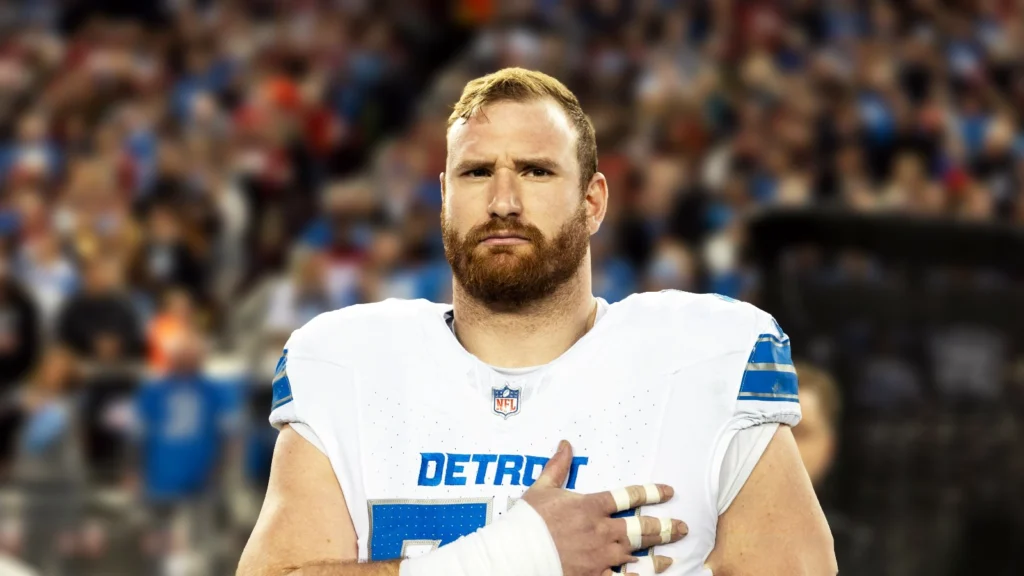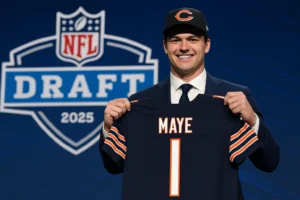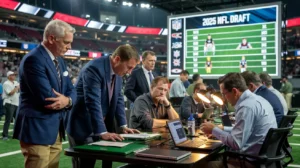
The news reverberated through the NFL landscape like a thunderclap, leaving Detroit Lions fans and the broader league in a state of stunned disbelief. Frank Ragnow, the bedrock of the Lions’ formidable offensive line and one of the premier centers in professional football, has announced his retirement. At just 29 years old, and seemingly at the peak of his powers following a stellar 2024 season, Ragnow’s decision to step away from the game cites a profound and ultimately unavoidable reason: his ongoing battle with health issues. This abrupt departure creates a seismic shift for a Detroit Lions squad poised for continued contention, leaving a significant void that will undoubtedly challenge the team’s strategic blueprint moving forward.
Ragnow’s career, spanning seven seasons since being drafted 20th overall in 2018 out of Arkansas, has been a testament to both his extraordinary talent and his unwavering resilience. A four-time Pro Bowl selection and a three-time second-team All-Pro, Ragnow consistently delivered elite-level play, anchoring an offensive line that became the envy of the league. His ability to dominate opposing defensive linemen, coupled with his astute communication and leadership, was instrumental in shaping the Lions’ identity under Head Coach Dan Campbell and General Manager Brad Holmes. He was more than just a lineman; he was the cerebral core of an offensive unit that propelled the Lions to unprecedented recent success, including deep playoff runs. The phrase “Frank Ragnow retirement” immediately signifies a monumental loss for a franchise that has meticulously built its foundation.
However, beneath the veneer of consistent excellence lay a relentless struggle against physical ailments. Ragnow’s playing career was punctuated by a litany of injuries that would have sidelined lesser athletes. From a fractured throat sustained in 2021 that required a unique brace and immense courage to play through, to persistent turf toe issues and a partially torn pectoral muscle, Ragnow’s body has endured a punishing toll. In his heartfelt announcement, he candidly admitted to attempting to convince himself that he could continue to perform at the elite level he demanded of himself, despite the mounting physical challenges. Ultimately, the cumulative impact of these injuries became undeniable, forcing a decision that prioritized long-term health and family over the relentless demands of professional football. The sheer grit and determination Ragnow displayed to consistently return to the field, often playing through immense pain, only underscore the severity of the health concerns that ultimately led to his premature Frank Ragnow retirement.
The immediate fallout from Ragnow’s decision presents a substantial challenge for the Detroit Lions. His presence was not just about individual performance; it was about the cohesion and collective strength of the entire offensive line. His departure creates a critical vacancy at center, a position that demands both physical prowess and exceptional mental acuity to call out protections and direct blocking schemes. The Lions will now pivot to assess their internal options. Veteran Graham Glasgow, who has demonstrated versatility and experience across multiple interior line positions, immediately becomes a leading candidate to assume the starting center role. Additionally, the development of promising rookie Tate Ratledge, selected in the recent NFL Draft, will be accelerated. The transition will be a critical storyline as the Lions prepare for the upcoming season, and the team’s ability to maintain its offensive line dominance without Ragnow will heavily influence their championship aspirations. The impact of the Frank Ragnow retirement extends beyond individual statistics; it affects the very rhythm and flow of the Lions’ potent offense.
For fans, the news of Frank Ragnow’s retirement is bittersweet. There is undoubtedly sadness at the loss of a fan favorite and an elite player, but also an overriding sense of gratitude for his contributions and admiration for his courage in making such a difficult personal choice. His legacy in Detroit will be one of unwavering commitment, exceptional talent, and a pivotal role in transforming the Lions into a perennial contender. While the chapter on his playing career closes, the impact of Frank Ragnow’s time with the Detroit Lions will resonate for years to come, serving as a reminder of the human element behind the gladiatorial spectacle of professional football. The Detroit Lions organization, while undoubtedly reeling from the Frank Ragnow retirement, will now embark on the crucial task of adjusting and retooling, aiming to uphold the high standards he helped to establish.

